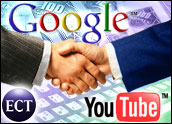
Google is supposedly setting aside a US$500 million slush fund to cover copyright infringement claims likely to arise in connection with its YouTube.com acquisition. However, the rumor, which surfaced this week in a blog, is not true, claimed Google CEO Eric Schmidt at the Web 2.0 Summit.
The company might want to reconsider that position. As it proceeds with its takeover of the wildly popular Web site that allows anyone to post videos about anything, Google is opening itself up to a new level of legal exposure.
It acknowledged as much in its quarterly filing with the Securities and Exchange Commission. “Our planned acquisition of YouTube may also subject us to additional copyright claims upon the closing of the transaction,” it said.
The online video service that Google launched early this year already has been sued for copyright infringement, according to the same filing. When YouTube is legally under Google’s umbrella, the situation is likely to get worse.
Multiple Levels of Exposure
The type of lawsuit that deep-pocketed Google could expect would be from a media company whose copyrighted video — a TV show, music concert or movie, for instance — was posted on the YouTube.com site without permission. At present, Google is in talks with media companies over this very issue. Ditto for individual owners of copyrighted material, such as local bands.
Another potential source of legal trouble is the widespread practice of gamers posting their sessions on the site — Xbox games, in particular Halo, are quite popular — often to the accompaniment of copyrighted music.
There are, however, other exposures to consider.
Conceivably, Google could be a contributing party to a defamation action, suggested Ilan Barzilay, an intellectual property lawyer with Wolf, Greenfield & Sacks. “People can say nasty things about somebody in a video as easily as they can online or in print. If they are not true, Google could be liable,” he told TechNewsWorld.
Privacy is another issue that Google must watch, Barzilay warned. For example, someone who videotapes an unsuspecting individual on private property and posts the video online could be violating a law.
Google must develop processes to ensure that problematic videos can be removed from the site, Barzilay said. Even so, the company might not be immune from lawsuits. “What if it isn’t taken down right away or a request is somehow missed?” he speculated.
The Grokster Decision
Google can take some comfort from last year’s so-called Grokster decision, in which the U.S. Supreme Court found that Grokster and StreamCast file-sharing service providers were liable for encouraging copyright infringement.
That decision expanded upon the Betamax doctrine established some 20 years ago, when the Supreme Court ruled that video recording devices did not violate copyright laws because they had a clear legal use. Grokster, by contrast, was designed to do little else but allow the exchange of copyrighted material.
What Google must weigh is that although YouTube.com is designed for the legal sharing of video content, it could also help bootleggers to distribute copyrighted material, J. Alexander Hershey, associate with Thorp Reed & Armstrong, told TechNewsWorld.
By simply providing a bulletin board, Google opens itself up to liability, Hershey said.
“In essence, they are facing the same problems that the early Napster did. While the service did serve a noninfringing purpose, it was also used to distribute copyrighted content,” he explained.
“This is very much an evolving landscape for companies,” Hershey added.
Risky Business
It is not a foregone conclusion that Google’s liability will significantly increase as a result of the YouTube acquisition.
“Google is already providing a lot of the same services that YouTube provides. If it has any additional risk, it would be because of additional volume of videos on its Web site,” Randy Broberg, chair of Allen Matkins’ intellectual property practice group, told TechNewsWorld.
Any such lawsuit could test the limits of the Digital Millennium Copyright Act, which provides a “safeharbor” to service providers that allow file-sharing. As a telephone company is not legally responsible for crank calls made over its network, a YouTube.com-type site is not responsible for the content that it hosts.
However, the more actively Google polices its site, the less likely it would be considered the neutral party specified in the law, said Broberg.
It’s a catch-22 for Google, but one that is not likely to give the company pause. “They are willing to take chances to make law at that company — I will say that,” Broberg remarked.
Legal Balancing Act
Google has to walk a fine line. “On the one hand, YouTube.com — and now Google — has a pretty clear-cut lack of direct liability for copyright infringement, since they are merely providing the mechanism by which distribution occurs, not actually posting the content themselves for distribution,” Dan Venglarik of Munck Butrus told TechNewsWorld.
“However, the … Grokster decision created — or, depending on your perspective, reaffirmed — contributory liability for inducing copyright infringement by others,” he said.
“What does and does not constitute inducement is still pretty vague, although actively encouraginginfringement would obviously be sufficient. The court looked at factors such as whether the defendantprofited from the infringement, and what steps the defendant took to prevent infringement or to stopinfringement, upon receiving notice,” Venglarik added.
Process Will Be Key
Google’s success will depend on the way it deals with violations of copyright law and the mechanisms it provides users to request the removal of potentially infringing material.
“A vigorous campaign on the part of Google would show, if nothing else, a good faith effort,” Hershey said. “It’s doubtful that Google faces any liability for events prior to their acquisition of YouTube. So, thereal question is, what do they face going forward based on how they run the site?” Venglariksaid.
Google has indicated that it will be tough on copyright infringement, but it hardly has any choicein that regard, he observed.
Will YouTube retain the character of YouTube after Google tries to lawyer-proof it? Even the lawyersare doubtful.
If Google makes the site too difficult to use for sharing video content, it will likely lose marketshare to the next YouTube-like startup, Venglarik predicted.
Google may not succeed in the video-sharing space because it is so large as to be institutional, he added, noting that “such enterprises can’t afford to take the risks that smaller companies can weather.”
Google is likely to “err on the side of playing it safe and, in the end, lose the appeal thatdrew users to YouTube,” he predicted.




















































